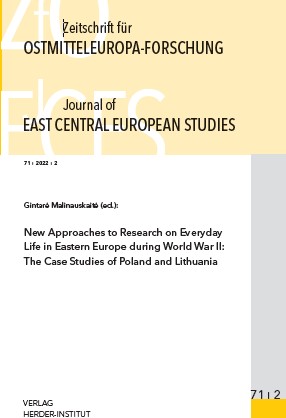Criminality in the Face of Life and Death: Crime and Criminal Prosecution as a Part of Everyday Life in the Warsaw Ghetto
Criminality in the Face of Life and Death: Crime and Criminal Prosecution as a Part of Everyday Life in the Warsaw Ghetto
Author(s): Judith VöckerSubject(s): History of Law, Criminal Law, Local History / Microhistory, Government/Political systems, Criminology, WW II and following years (1940 - 1949), Fascism, Nazism and WW II, History of the Holocaust
Published by: Verlag Herder-Institut
Keywords: Legal history; Holocaust; Warsaw Ghetto; General Government; Nazi jurisdiction; Nazi occupation of Poland; World War II;
Summary/Abstract: This article provides an overview of the criminal prosecution of Jews from the Warsaw ghetto by German court entities during the Nazi occupation of the General Government. As the title suggests, a specific focus lies on how the residents of the ghetto were pushed into a legal gray area by an increasingly dense network of anti-Jewish legal guidelines. As this article also highlights, however, committing acts that the occupiers had deemed criminal offenses also sometimes aided Jews in their survival of imprisonment in ghettos. This article takes a chronological approach: it begins with a discussion of the history of “Jewish ghettos” from the Middle Ages onwards, leading up to the establishment of ghettos in the General Government throughout the early 1940s. Since the legal sphere is the focus of this article, it outlines the Nazi definition of a criminal offense in the Warsaw ghetto will and which social and personal changes the imprisonment in ghettos meant for Jews during occupation. Even though the Nazi restrictions made several dozen offenses legally punishable, even by death, committing these criminal offenses could ensure Jews’ survival, for example, by participating in illegal trade, smuggling, or the forging of identity cards or money. In this way, criminality became an increasingly frequent part of everyday life and survival of Jews imprisoned in ghettos. Through the establishment of so-called German Courts and Special Courts in the district capitals of the General Government, the occupiers set up a dense and expansive legal network through which they were able to prosecute any criminal activity on a seemingly official basis. In an attempt to make this history more tangible, this article discusses cases of smuggling, illegal trade, bribery, spreading rumors, and derogatory language as brought in the German Court and Special Court in Warsaw against Jewish defendants. Even though the German Criminal Code and a plethora of continuously issued legal decrees were rigously applied in these court proceedings, the verdicts of the German Court and Special Court in Warsaw were seldom consistent or stringent throughout the years of occupation.
Journal: Zeitschrift für Ostmitteleuropa-Forschung
- Issue Year: 71/2022
- Issue No: 2
- Page Range: 201-234
- Page Count: 34
- Language: English

